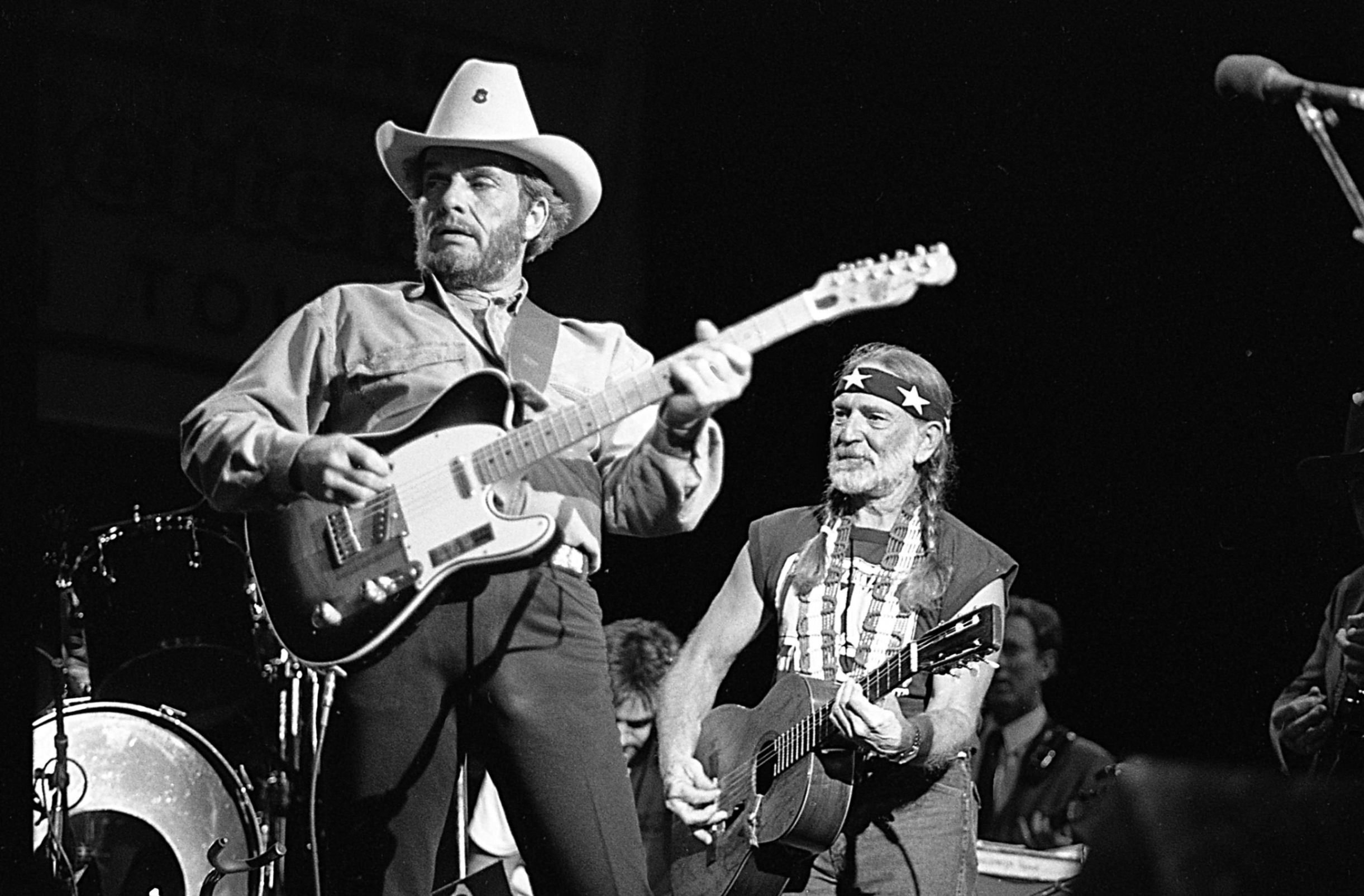Willie Nelson’s Tribute to Merle Haggard: “He Won’t Ever Be Gone” and the Immortality of Musical Legacy
Willie Nelson’s Tribute to Merle Haggard: “He Won’t Ever Be Gone” and the Immortality of Musical Legacy
In the landscape of American country music, few names carry as much weight as Willie Nelson and Merle Haggard. Both men were pillars of the genre, shaping its sound, culture, and spirit through decades of innovation, storytelling, and authentic expression. When Merle Haggard passed away in 2016, the country music world felt the loss deeply—not just because of his iconic songs, but because of the man behind the music, a friend to fellow artists and a mentor to a new generation of musicians. It is in this context that Willie Nelson’s song “He Won’t Ever Be Gone” emerges as more than just a tribute; it is a meditation on legacy, friendship, and the enduring life of an artist through the love of fans and the resonance of their work.

Willie Nelson, himself a legendary figure in country music, has spent a lifetime observing and participating in the evolution of the genre. From his early days in Texas to becoming a global icon, Nelson’s career has been defined by both innovation and respect for tradition. Merle Haggard shared a similar path. Born in Bakersfield, California, Haggard rose from a troubled youth, including time spent in prison, to become one of country music’s most influential voices. His songs reflected real life, hardship, resilience, and the American spirit. The intersection of these two lives—Nelson and Haggard—was not merely professional but deeply personal. Their friendship was marked by mutual admiration, collaboration, and shared experiences that only those who walk the road of a touring musician can truly understand.
The song “He Won’t Ever Be Gone” serves as Nelson’s musical eulogy for Haggard. It is, at its heart, a love letter to a friend who was taken too soon but whose spirit remains unbroken. While many artists have written songs about loss, Nelson’s approach is distinct. Rather than dwelling on grief or sorrow alone, he focuses on continuity—the way a person’s influence endures beyond their physical presence. Nelson’s lyrics capture the paradox of mourning someone while simultaneously celebrating their immortality: a dual recognition of absence and presence. As he sings, Haggard may no longer walk the earth, but he continues to live through the music he created, the inspiration he provided to others, and the memories of those who loved him.
This idea resonates deeply in the country music tradition. Unlike genres where fame may be fleeting, country music has always prized storytelling, legacy, and generational continuity. Artists like Haggard and Nelson are not merely entertainers; they are chroniclers of American life, historians of emotion, and bearers of cultural memory. When Haggard passed, his fans did not simply lose a performer—they lost a voice that articulated their joys, struggles, and aspirations. Nelson’s tribute acknowledges this collective mourning while offering hope: the music endures, and with it, Haggard’s spirit.

An essential element of “He Won’t Ever Be Gone” is its emphasis on mentorship and the intergenerational transmission of musical influence. Nelson observes that Haggard’s songs continue to inspire younger artists who carry forward his style, themes, and musical innovations. In doing so, Haggard’s voice is multiplied, echoing through the performances of others and ensuring that his contributions remain vital in contemporary country music. This reflects a profound understanding of artistic immortality: an artist lives on not only in memory but in influence, in the creative expressions of those who follow. In Nelson’s song, we hear both admiration and recognition, an acknowledgment that while Haggard’s physical presence is gone, the essence of who he was and what he contributed persists in the world he helped shape.
Friendship is another central theme of Nelson’s tribute. Haggard and Nelson shared decades of camaraderie, often performing together, exchanging ideas, and supporting one another through personal and professional challenges. Nelson’s song captures the intimacy and respect inherent in this bond. By framing Haggard’s passing in terms of enduring friendship rather than solely loss, Nelson reminds listeners that relationships transcend death. The emotional resonance of the song comes not just from Haggard’s absence but from the richness of their shared experiences—a lifetime of music, laughter, and mutual respect distilled into melody and lyric.

Musically, “He Won’t Ever Be Gone” embodies the simplicity and sincerity characteristic of both artists. Nelson’s signature phrasing, understated guitar work, and evocative vocals allow the lyrics to take center stage. The melody, gentle yet poignant, reinforces the reflective and reverential tone of the piece. It is a song meant to be listened to attentively, to feel the weight of friendship and the comfort of knowing that someone’s spirit can remain present through art. The musical choices mirror the thematic content: restraint, authenticity, and emotional truth. In this way, Nelson honors Haggard not through grandiose gestures, but through a faithful, heartfelt rendering that echoes the sincerity for which both men are renowned.
Beyond the personal tribute, the song speaks to a universal human experience: how we cope with the loss of those we admire, love, and respect. Nelson’s message is clear—while death ends a life, it does not erase the contributions, the inspiration, or the love someone leaves behind. Haggard’s songs continue to be sung, his style emulated, and his stories retold, ensuring that his presence remains part of the cultural consciousness. For fans of country music, this is not merely comforting; it is a validation of the genre’s enduring relevance and the deep emotional connections it fosters between artists and listeners.
The cultural impact of Haggard, as highlighted by Nelson’s tribute, extends beyond music. Haggard’s life and career embodied resilience, authenticity, and the complex realities of American life. Nelson’s song reminds listeners that such figures, though mortal, contribute something timeless. Their lessons, struggles, and triumphs become part of a shared heritage, preserved not only in recordings but in collective memory, performances, and the ongoing interpretation of their art. This concept of enduring presence is particularly powerful in music, where sound itself can bridge generations, geographic distances, and even lifetimes.
In the broader context of country music history, “He Won’t Ever Be Gone” can be seen as part of a tradition of commemorative songs that honor peers and mentors. From Johnny Cash to Patsy Cline, country music has long embraced narratives that explore loss, memory, and tribute. Nelson’s song contributes to this lineage while highlighting the unique relationship he shared with Haggard. The personal dimension elevates the song from a generic homage to an intimate reflection on friendship, artistry, and the ways in which one life can influence countless others.
Ultimately, “He Won’t Ever Be Gone” is a meditation on legacy. Willie Nelson reminds us that true immortality lies not in avoiding death but in the lasting effects of one’s actions, creativity, and connections. Merle Haggard may no longer be physically present, but his essence continues to shape country music, inspire musicians, and resonate with fans around the world. Through Nelson’s tribute, listeners are invited to celebrate Haggard’s life, honor his contributions, and reflect on the enduring power of music to preserve memory, emotion, and influence across time.

In a world where fame is often fleeting and public attention ephemeral, the song underscores a profound truth: the most meaningful legacies are those built through connection, inspiration, and authenticity. Merle Haggard’s life exemplifies this principle, and Willie Nelson’s tribute ensures that these lessons are communicated to a new generation. For anyone who has experienced loss, “He Won’t Ever Be Gone” offers reassurance that those we love, admire, and respect continue to live on—in our hearts, in our memories, and through the music and culture they helped shape.
Willie Nelson’s heartfelt tribute thus transcends mere commemoration. It is a declaration of belief in the enduring power of friendship, artistry, and cultural legacy. It captures the essence of Merle Haggard’s impact while offering hope and inspiration to fans and fellow artists alike. Through Nelson’s words and music, Haggard’s presence is reaffirmed, his contributions celebrated, and his spirit, indeed, shown to be alive and well—because true artistry never dies.




